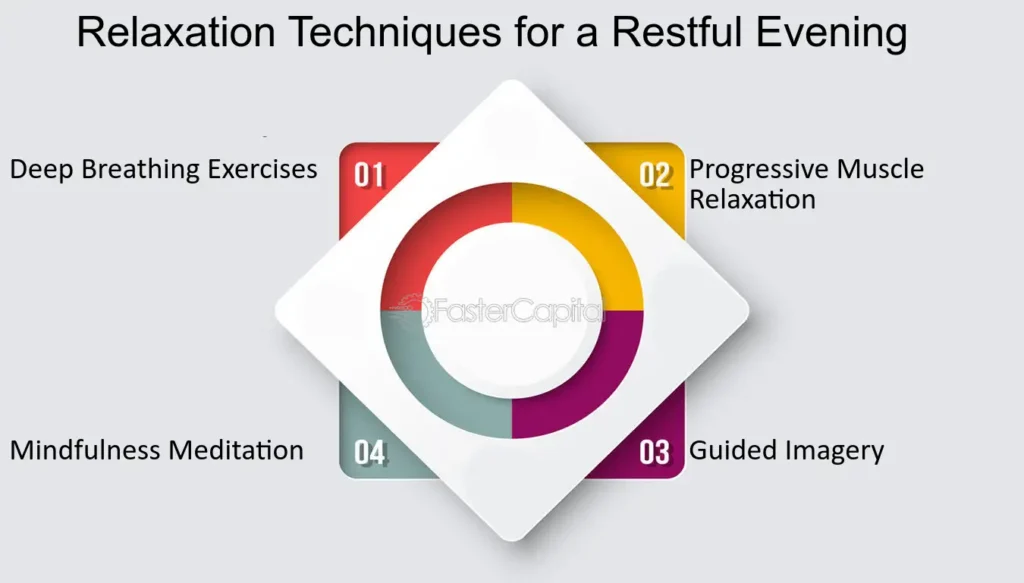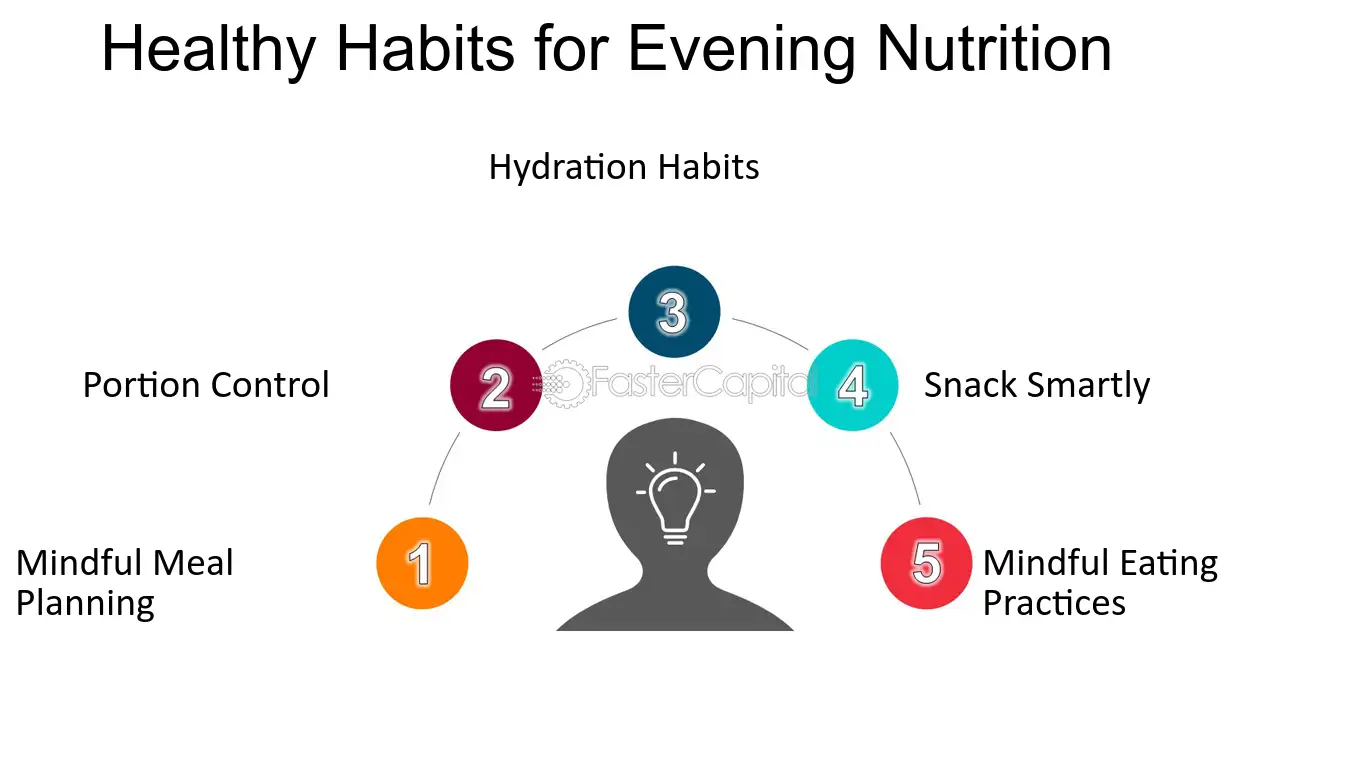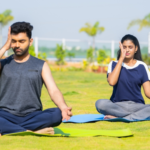Introduction
“Ayurvedic Evening Rituals” Did you know that over 55% of Americans struggle with insomnia or lack of quality sleep? The news is good. Ayurveda, an ancient Indian system of medicine, takes a holistic approach. It promotes relaxation and better sleep through simple evening rituals. This article will explore 10 Ayurvedic evening rituals. They can help you release the day’s stresses and have a calming, restful night.
Ayurveda emphasizes the importance of a balanced daily routine. Adding these Ayurvedic practices to your evening routine can change your well-being. Care for yourself first. Make a soothing transition from the day’s activities. This can improve your sleep. You’ll wake up feeling refreshed and rejuvenated.
The Importance of Ayurvedic Evening Rituals

Ayurvedic evening rituals help people align with the day’s natural rhythms. They also help them relax. The three Ayurvedic doshas are vata, pitta, and kapha. Understanding them can help you tailor your evening routine. It can help you fix imbalances. This will promote balance in the mind and body.
Understanding the Doshas
Vata, pitta, and kapha are the three key principles. They govern the body’s physical and mental functions. Recognizing your unique dosha mix can guide you. It helps you create an evening routine that meets your needs and restores balance.
The Benefits of Unwinding
Doing Ayurvedic evening rituals has many benefits. These include less stress, better sleep, and improved well-being. Focus on self-care. Make a soothing transition from the day. Then, you can relax and get ready for a good night’s sleep.
Eat an Ayurvedic Dinner
Ayurveda emphasizes the importance of mindful eating, particularly during the evening meal. To aid digestion and aid relaxation, eat a light, healthy dinner. Avoid heavy, late-night meals. They can cause discomfort. Ayurvedic Evening Rituals
Eat Light and Healthy
An Ayurvedic dinner should be light, easy to digest, and nourishing. Opt for a balance of fresh, seasonal vegetables, whole grains, and lean proteins. Avoid fried, spicy, or heavy foods. They can burden digestion and harm sleep.
Disconnect to Reconnect
Also to eating a balanced Ayurvedic meal. It’s essential to stop using electronic devices. You should also have mindful conversations with loved ones. This transition can help you shift from the day’s activities. It fosters a sense of connection. This can help you be more peaceful as you prepare for sleep.
Make Time for Gentle Movement
Incorporating gentle movement into your evening routine can be beneficial. Taking a nature walk after dinner can calm the mind and aid digestion. Gentle yoga stretches can help reduce stress. They also soothe nerves and ready the body for sleep. These activities can affect both physical and mental health.
Evening Nature Walk
A peaceful nature walk can be a wonderful way to transition from the day to relaxation. Try one in the evening. Gentle movement, fresh air, and nature can quiet the mind. They also promote serenity. As you stroll, focus on your breath and the sensations in your body, allowing the worries of the day to fade away.
Gentle Yoga Stretches
Adding easy yoga stretches to your evening routine can reduce stress. They also prepare the body for a deep, restorative sleep. The gentle poses focus on relaxation. They include child’s pose, supine twist, and easy seated forward fold. They can release muscle tension, calm the nervous system, and create inner peace. Do these soothing practices for 10-15 minutes before bedtime. You will feel the benefits.
You May Also Like:
Ayurvedic Morning Rituals for Holistic & Powerful Well-being 2024
Diaphragmatic Breathing
Diaphragmatic breathing, also called belly breathing, is an Ayurvedic practice. It can shift the body and mind from stress to relaxation. Breathe deeply and slowly using the diaphragm. This activates the parasympathetic nervous system. It is in charge of rest, digestion, and restoration.
The Mind-Body Connection
Diaphragmatic breathing taps into the mind-body link. It lets you consciously influence your body. Breathing deeply signals to your brain. It tells it to shift from fight-or-flight to rest and digest. This promotes well-being.
Techniques for Diaphragmatic Breathing
To practice diaphragmatic breathing, begin by finding a comfortable, quiet space. Sit or lie down, placing one hand on your chest and the other on your belly. Slowly inhale through your nose, feeling your belly expand. Pause for a moment. Then, exhale slowly through your mouth. Let your belly gently deflate. Repeat this breathing pattern for several minutes. Focus on the feeling of the breath moving in and out. With regular practice, belly breathing can become natural. It is very calming and part of your evening routine.
Benefits of Diaphragmatic Breathing Diaphragmatic Breathing Techniques
- Reduces stress and anxiety
- Improves respiratory function
- Enhances oxygen circulation
- Promotes relaxation and sleep
- Balances the autonomic nervous system
- Sit or lie in a comfortable position
- Place one hand on your chest, the other on your belly
- Inhale slowly through your nose, feeling your belly expand
- Pause for a moment, then exhale slowly through your mouth
- Repeat for several minutes, focusing on the breath
Ayurvedic Evening Rituals

Pranayama is the Ayurvedic practice of breath control. It offers many techniques to promote relaxation and balance. One particularly effective practice is Nadi Shodhana, or alternate nostril breathing. This simple exercise can reduce anxiety. It can also relieve intensity and restore balance to the mind and body. So, it is an ideal addition to your evening routine.
Pranayama: Nadi Shodhana (Alternate Nostril Breathing)
Nadi Shodhana is a powerful Pranayama technique. It involves alternate nostril breathing. It can greatly impact your well-being. Gently alternate the breath in and out of each nostril. This can create a sense of balance and harmony in the mind and body. Studies have shown that this practice reduces stress, improves sleep, and boosts thinking. This makes it a great choice for an Ayurvedic evening ritual.
To practice Nadi Shodhana, sit in a comfortable, upright position. Use your right thumb to close your right nostril. Inhale slowly through your left nostril. At the start of the inhale, use your right ring finger to close your left nostril. Then, exhale through your right nostril. Repeat this cycle, alternating the nostrils with each inhalation and exhalation. Aim to practice for 5-10 minutes, focusing on the smooth, rhythmic flow of your breath.
By doing Nadi Shodhana in your evening routine, you can create peace and balance. This will help you move into a restful night’s sleep.
Brew a Sleepy Time Ayurveda Drink

Adding an Ayurvedic bedtime drink to your evening routine can soothe you. It helps you transition into rest. Don’t reach for alcohol. It can disrupt sleep. Instead, try our Calming Night Milk, a warm, comforting beverage.
Calming Night Milk Recipe
This recipe features organic milk infused with Ayurvedic spices. The spices include ginger, cardamom, cinnamon, and nutmeg. The recipe can help you relax and sleep well. These fragrant herbs and spices calm the mind. They also prepare the body for a restful night’s sleep.
You need 1 cup of Organic Whole Milk. And, 1/4 teaspoon each of Ground Ginger, Ground Cardamom, and Ground Cinnamon. Plus, 1/8 teaspoon of Ground Nutmeg. You can add 1 teaspoon of Honey, if you want.
To make the Calming Night Milk, just mix the milk and spices in a small saucepan. Heat over medium, stirring sometimes. Do this until the mix is warm and smells good. If desired, stir in a teaspoon of honey to add a touch of sweetness. Sip and savor this comforting beverage as you wind down for the evening.
Massage the Day Away with Abhyanga

Abhyanga is Ayurvedic self-massage. It is a powerful tool for promoting relaxation and releasing stress. Focusing on specific areas, such as the feet (Padabhyanga), can have a calming effect on the entire body. Take a few minutes before bed to gently massage your feet with warm oil. This can help improve circulation, ease tension, and bring inner peace.
Padabhyanga (Foot Massage)
One of the most deep Ayurvedic evening rituals is the practice of Padabhyanga. It is the Sanskrit term for foot massage. This gentle, soothing practice can help regulate vata dosha. This dosha is often linked to anxiety and restlessness. By massaging the feet with warm, nourishing oils, you can promote grounding. It also helps with relaxation and better sleep.
To perform Padabhyanga, follow these simple steps:
- Warm a small amount of Ayurvedic oil, such as sesame or coconut oil, in your hands.
- Begin massaging one foot, starting at the toes and working your way up to the ankle. Use gentle, circular motions to stimulate the acupressure points on the feet.
- Pay special attention to the soles, heels, and the areas between the toes. These areas are very beneficial for relaxation.
- Repeat the process on the other foot, ensuring both are thoroughly massaged.
- Allow the oil to absorb into the skin for a few minutes before wiping off any excess with a warm, damp cloth.
Adding this easy Padabhyanga ritual to your nightly routine can help you calm down. It can help you release tension. It will also prepare your body and mind for restful sleep.
Unwind with Aromatherapy
Using essential oils and aromatherapy in your evening routine can be simple. It’s a way to promote relaxation. For example, lavender, chamomile, and vetiver can trigger physical responses. These responses can help you relax and get ready for sleep. You can use aromatherapy by misting your pillow. You can also add a few drops to a warm bath or diffuse the oils in your bedroom.
For example, people know lavender for its calming and soothing properties. This makes it an ideal choice to help you relax and drift off to sleep. Chamomile has a different use. For centuries, people have used it to ease anxiety and bring tranquility. Vetiver is a fragrant grass native to India. It is often used in Ayurvedic practices to ground and center the mind. This helps to create a deeper state of relaxation.
Add these smells to your evening routine. They will make a world that tells your body and mind to let go of the day’s stresses and rest. Try different essential oils. Find the ones that resonate most with you. Let their healing properties guide you to a more peaceful and restful night’s sleep.
Practice Healthy Sleep Hygiene Ayurveda Style

Ayurveda is the ancient Indian system of medicine. It emphasizes the need for a balanced sleep-wake cycle. This cycle should align with the body’s natural rhythms. Add Ayurvedic sleep hygiene practices to your evening routine. They will help you get better sleep. This will improve your health and well-being.
Ideal Sleep and Rise Times
Ayurvedic principles say the best sleep and rise times can vary. They vary based on a person’s main dosha: vata, pitta, or kapha. Generally, it is best to go to bed at 10:00 PM to 10:30 PM. This aligns with the doshas’ cycle. Wake up between 6:00 AM and 6:30 AM. At that time, the body’s natural rhythms are in balance. This can further support health and well-being. By following these Ayurvedic rules, you can set a regular sleep-wake pattern. This pattern brings deep, restful sleep and a fresh start to your day.
Adding these Ayurvedic sleep tips to your evening routine can improve sleep. They can also boost energy and well-being. By aligning with your body’s circadian rhythms, you can create a balanced lifestyle. This sets the stage for peaceful, restorative sleep.
Conclusion
Adding Ayurvedic evening rituals to your daily routine can greatly impact your well-being. These practices help align your body and mind with natural rhythms. They promote relaxation, reduce stress, and improve sleep. Make small, planned changes to your evening habits. They create a peaceful transition from the day’s activities. This will prepare you for a restful night.
You get benefits from each ritual. They include enjoying a light, healthy dinner. And doing gentle yoga, stretches, and breathing exercises. Drinking a soothing beverage, like Calming Night Milk, can relax you. So can doing Abhyanga self-massage and aromatherapy. By understanding and balancing your doshas. You can tailor these practices to fit your needs. This will help you achieve greater harmony within yourself.
Remember, the key to successful Ayurvedic practices is consistency. Doing these rituals every evening. You’ll likely see better sleep, less stress, and improved health. Embrace these Ayurvedic principles and allow yourself to unwind and rejuvenate each evening. With time and dedication, you’ll create a nurturing environment. It supports your physical and mental well-being. This will help you wake up refreshed and ready for each new day.









